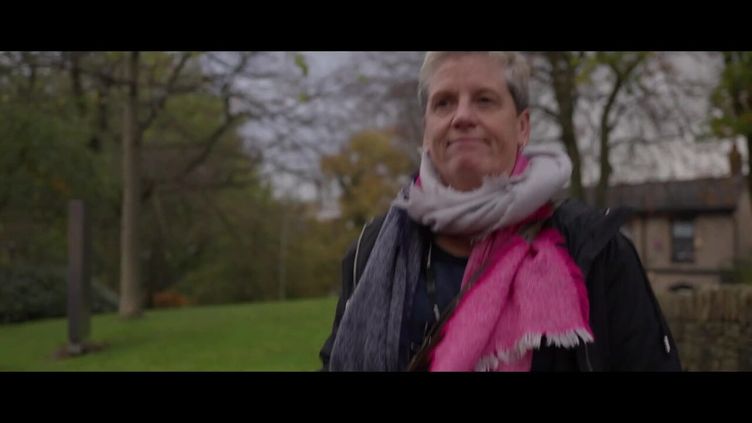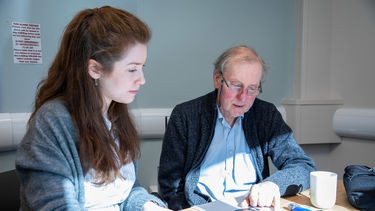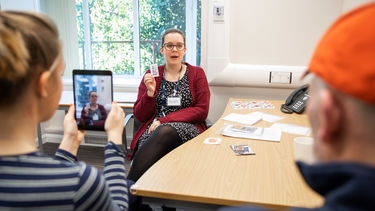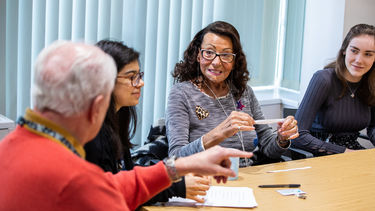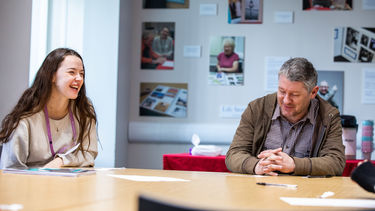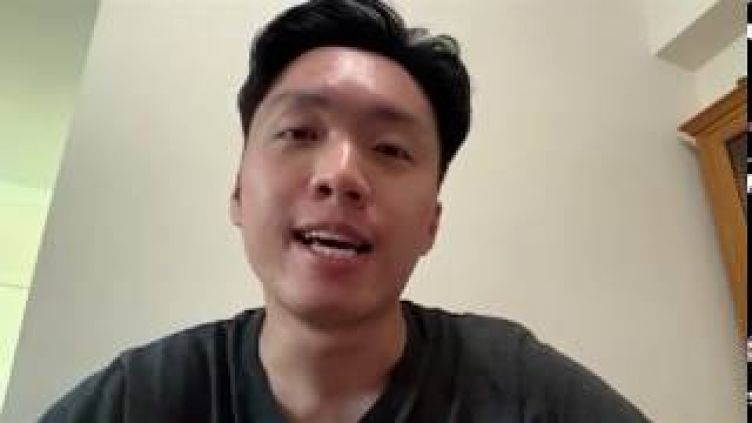Speech and Language Therapy BMedSci
2025-26 entryOur accredited Speech and Language Therapy BMedSci course combines clinical practice and theoretical knowledge with case-based learning, to prepare you for a rewarding career supporting people with communication or swallowing difficulties.
Key details
- A Levels AAB
Other entry requirements - UCAS code B621
- 3 years / Full-time
- September start
- Accredited
- Find out the course fee
- Industry placement
Explore this course:
Course description
Why study this course?
Annual NHS grants are available for all eligible UK home students to help you with your studies, as well as funding to cover the cost of placements.
You’ll build up your practical skills and experience in our specialist speech and language therapy clinic, working directly with people with communication difficulties.
There will be plenty of opportunities to put your knowledge into practice on a diverse range of placements, including schools, clinics and hospitals.

Gain the knowledge, clinical skills and confidence you need to deliver life-changing care for people with communication difficulties.
The three-year speech and language therapy degree at the University of Sheffield is designed and delivered by qualified speech and language therapists, researchers and clinicians.
Our experienced teaching team is dedicated to turning you into one of the next generation of experts – showing you how to assess, diagnose and support children and adults who have difficulties with communication, or eating, drinking and swallowing.
Throughout your degree, you’ll study linguistics, psychology and speech pathology, and assimilate the medical knowledge that supports these areas. You’ll explore how sociology and social psychology impact therapy.
As your understanding grows, you’ll explore how therapists can support people who have suffered a stroke, have learning disabilities, speech sounds disorders or autism.
The skills you gain at Sheffield will provide you with an excellent foundation to specialise in any of these areas, and the research skills that are essential to providing evidence-based healthcare.
This course is approved and accredited by the Health and Care Professions Council (HCPC) and the Royal College of Speech and Language Therapists (RCSLT).
Our curriculum is informed by the QAA benchmarks for speech and language therapy, the RCSLT curriculum guidelines and the HCPC standards of proficiency and standards of education and training for speech and language therapists.
Modules
A selection of modules are available each year - some examples are below. There may be changes before you start your course. From May of the year of entry, formal programme regulations will be available in our Programme Regulations Finder.
Choose a year to see modules for a level of study:
UCAS code: B621
Years: 2022, 2023, 2024
Core modules:
- Professional Practice 1
-
This module aims to introduce the student to the professional practice of the speech and language therapist (SLT). The module combines students' learning of theoretical knowledge of clinical methods, people with communication and eating, drinking and swallowing impairments and inter-personal and professional skills with clinical placements with children and adults with communication (and in some cases eating, drinking and swallowing) impairments. The module introduces the student to their first clinical placements with children and adult clients across placements in the Philippa Cottam Communication Clinic (PCCC) (the clinic in HCS), plus external placements in the NHS and independent sectors.
30 credits - Biomedical Science
-
This module will explore components of anatomy, physiology, and neuroscience that are relevant to the understanding of human communication throughout the lifespan. This will include the respiratory, cardiovascular and nervous systems, the development, structure and function of head, and neck, and the auditory system.
20 credits - Introduction to Practical Linguistics
-
This module will introduce students to the scientific study of the structure and function of language. Students will learn basic linguistic concepts and theoretical constructs with special application to how these ideas help us understand speech in both typically and atypically developing populations.
20 credits - Participation and Society
-
This module aims to introduce students to issues related to understanding persons as individuals, and as members of society. Content includes: theoretical models of disability; psychosocial impact of disability across the lifespan; concepts of self and identity; concepts of attitudes and their measurement; health beliefs and behaviours and the role of gender, socioeconomic and cultural factors in healthcare and education. Students will be encouraged to reflect on their own experiences, attitudes and interpersonal skills in the context of their impact on interactions with clients, their families and other professionals.
20 credits - Speech, language, communication and literacy development in children
-
This module will cover children's development of speech, language, communication and literacy. It addresses the following topics: speech sound / phonological development, language production and comprehension, development of pragmatics abilities, early literacy development, the associations between speech, language and literacy, theoretical models of literacy development, understanding drivers and competing theories of how children learn language, bilingualism and the impact on language learning. The lectures will cover developmental norms and trajectories. It will also cover factors which influence typical development. The theoretical basis of the topic will be considered from a multidisciplinary perspective, covering psychology, education, sociolinguistics, and linguistics.
20 credits - Language cognition and communication in adults 1
-
This module introduces students to theoretical accounts of language, cognition and communication in adults. It provides conceptual frameworks and a detailed elementary coverage of the following areas: the communication chain, verbal and non-verbal communication, conversation analysis, grammar, vocabulary, multilingualism, attention, memory and executive function. It also introduces students to the impact of ageing on the above domains, and the impact of stroke, traumatic brain injury and progressive degenerative conditions on language and cognition.
10 credits
Professional note: BMedSci Speech and Language Therapy; Royal Colledge of Speech and Language Therapists; HCPC
Core modules:
- Developmental differences in speech, language and communication
-
This module aims to give a detailed overview of the developmental differences in children's speech, language and communication (including literacy) abilities. The module profiles these developmental differences in children and adolescents, and including learning difficulties, autism spectrum conditions and other neurodevelopmental differences. The module examines these developmental differences in the context of the diverse environments children grow up in. The impact of these developmental differences on children's lives as they grow older (eg. educational experiences, learning and well-being) are highlighted. Other perspectives are explored such as those of the parent/carers.
20 credits - Key Clinical Topics 1
-
This module aims to equip students with the theoretical knowledge of a range of specific clinical topics in speech and language therapy. These topics include dysphagia, motor speech disorders, voice and neurology across child and adult populations. The themes of assessment, intervention, evidence based practice, standards of practice and clinical ethics and inter-disciplinary working will underpin these topics and enable integration across the topics.
20 credits - Language cognition and communication in adults 2
-
This module builds on material covered in Language cognition and communication in adults 1 at Level 1. The module covers assessment and diagnosis of language and cognitive deficits affecting communication, which arise due to stroke, traumatic brain injury and progressive neurological conditions including dementia.
20 credits - Professional Practice 2
-
This module builds on the unit Professional Practice 1. The student completes a series of NHS clinical placements across semesters 1 and 2 including a week block placement in the student summer vacation. The placements includes: (1) the schools placement working with school-age children; (2) the conversational partners placement working with adults in the community; (3) the special needs placement working with children with severe developmental communication impairments; and (4) the adult neurological placement working with adults in acute settings. 5) one session of audiology placement. Students will complete supervised clinical work during placements and self-study activities to support their learning and clinical skills. Placements will be supported by workshops and tutorials and specific NHS induction/preparation and support.
20 credits - Speech and Hearing Science
-
This module covers key concepts related to the scientific study of speech and hearing. There will be three broad areas covered within the module: articulatory phonetics, acoustic phonetics, and hearing science. The module will teach concepts relevant to the study of speech and hearing in both healthy and clinical populations. The module will be delivered using a combination of lectures and problem solving classes and will be assessed via two 1500 word assignments.
20 credits - Language Analysis: Sound and Structure
-
This module builds on the linguistic knowledge gained in Introduction to Practical Linguistics. Teaching will focus on developing students' abilities to apply phonetic observation skills to clinical data, to use advanced transcription techniques, and to use appropriate diagrams to describe the physical attributes of articulation and the role of timing in achieving articulatory targets.
10 credits
The module covers:
- Physical attributes of articulation- Using ExtIPA and diacritics- Using midsagittal diagrams- Articulatory targets and timing- Voicing and voice quality - Research Methods and Statistics
-
This module is designed to introduce students to research methods and data analysis techniques through a series of lectures and small-group workshops. The aim of this unit is to provide students with the opportunity to learn about and employ statistical techniques through the use of practical examples and data collection exercises. Topics covered will include (1) an introduction to research methods and the research process (2) formulating research questions and hypotheses (3) descriptive statistics and presenting data (4) samples and population distributions and (5) statistical tests (e.g., parametric and nonparametric tests; correlational analyses) (6) qualitative methods (7) principles of psychometrics (8) reliability, validity and effect sizes.
10 credits
Core modules:
- Evaluating the evidence base in speech and language therapy II. Clinical dissertation
-
Evidence-based practice is the integration of high quality research evidence with clinical expertise and service user experience in making decisions about the care of patients in speech and language therapy. Building on the skills and knowledge acquired in Evaluating the evidence base in speech and language therapy I: Principles and Methods, this module will enable students to further develop and apply their knowledge of research methodology appropriate to the study of language and communication. Students will also gain an enhanced understanding of appropriate approaches to research design for evidence based practice.
30 credits - Key Clinical Topics 2
-
This module aims to equip students with the theoretical knowledge of a range of specific clinical topics in speech and language therapy. These topics include a range of client groups and communication difficulties across child and adult populations. The themes of assessment, intervention, evidence based practice, standards of practice and clinical ethics and multi-disciplinary working will underpin these topics and enable integration across the topics.
30 credits - Professional Practice 3
-
This module aims to consolidate the student's clinical skills and prepare the student for independent practice on graduation at the end of this third and final year. Students complete two placements as follows: a paediatric placement, and an adult placement. University workshops and tutorials will prepare and support students with their learning on placement. Assessment includes a client based presentation, written client based assignment, a video-based exam with viva assessment and two Practice Educator Reports (PER) assess their ability work independently as newly qualified practitioners. All assessments must be passed.
30 credits - Evaluating the evidence base in speech and language therapy :. Principles and Methods
-
Evidence-based practice is the integration of best research evidence with clinical expertise and patient experience in making decisions about the care of individual patients in speech and language therapy. This module introduces the principles and methods of evidence-based clinical practice. Students will (1) critically evaluate the methodological quality of the research using evidence-based practice and (2) apply these conclusions to clinical practice.
20 credits - Transition to Professional Autonomy
-
This module will address issues relevant to work in modern healthcare and education contexts. It addresses the following issues: Employment (job hunting, CV writing and interview skills, support mechanisms, first posts, independent practice); The healthcare context (Ethics in clinical practice, Caseload management, Clinical governance, professional competencies and professional guidelines).
10 credits
The content of our courses is reviewed annually to make sure it's up-to-date and relevant. Individual modules are occasionally updated or withdrawn. This is in response to discoveries through our world-leading research; funding changes; professional accreditation requirements; student or employer feedback; outcomes of reviews; and variations in staff or student numbers. In the event of any change we'll consult and inform students in good time and take reasonable steps to minimise disruption.
Learning and assessment
Learning
You will learn through hands-on clinical placements in a range of healthcare settings, as well as in lectures, seminars, and practical classes. You will be supported by experienced teachers and speech and language therapists both at university and on placement.
Assessment
You will be assessed by exams, coursework, case-based assessments and oral presentations, as well as clinical tasks such as writing up case notes or planning therapy sessions.
Your clinical skills will also be assessed during your placements. You will also complete pre-registration to make sure you have the necessary knowledge and skills to support clients with dysphagia.
Programme specification
This tells you the aims and learning outcomes of this course and how these will be achieved and assessed.
Entry requirements
With Access Sheffield, you could qualify for additional consideration or an alternative offer - find out if you're eligible.
The A Level entry requirements for this course are:
AAB
- A Levels + a fourth Level 3 qualification
- ABB + B in a relevant EPQ
- International Baccalaureate
- 34
- BTEC Extended Diploma
- DDD in Applied Science or Health and Social Care
- BTEC Diploma
- Not accepted
- Scottish Highers
- AAAAB
- Welsh Baccalaureate + 2 A Levels
- B + AA at A Level
- Access to HE Diploma
- Award of Access to HE Diploma in a healthcare-related subject, with 45 credits at Level 3, including 36 at Distinction and 9 at Merit
-
We are unable to accept transfer requests from current University of Sheffield students wishing to transfer onto this programme from other courses
The A Level entry requirements for this course are:
ABB
- A Levels + a fourth Level 3 qualification
- ABB + B in a relevant EPQ
- International Baccalaureate
- 33
- BTEC Extended Diploma
- DDD in Applied Science or Health and Social Care
- BTEC Diploma
- Not accepted
- Scottish Highers
- AAABB
- Welsh Baccalaureate + 2 A Levels
- B + AB at A Level
- Access to HE Diploma
- Award of Access to HE Diploma in a healthcare-related subject, with 45 credits at Level 3, including 30 at Distinction and 15 at Merit
-
We are unable to accept transfer requests from current University of Sheffield students wishing to transfer onto this programme from other courses
You must demonstrate that your English is good enough for you to successfully complete your course. For this course, we require: GCSE English Language at grade 4/C; IELTS grade of 8.0 with a minimum of 7.5 in each component; or an alternative acceptable English language qualification
Equivalent English language qualifications
Visa and immigration requirements
Other qualifications | UK and EU/international
Due to the large number of applications we receive, we are unable to provide individual and specific feedback to applicants who do not receive an offer for a place on the course.
If you have any questions about entry requirements, please contact the school/department.
Graduate careers
Graduates from our course can register with the Health and Care Professions Council and practise as speech and language therapists.
Speech and language therapists are in high demand, and there are plenty of opportunities to specialise in areas such as mental health issues, stammering, hearing impairment, learning difficulties or neurological impairments.
Many of our graduates have gone on to successful careers within NHS trusts, schools, charities, private practices or the justice system. Others choose to go on to further postgraduate study and research.
School of Allied Health Professions, Nursing and Midwifery
The Complete University Guide 2025

The School of Allied Health Professions, Nursing and Midwifery sits in the Faculty of Health and brings together expertise from across three core areas: human communication sciences, nursing and midwifery, and orthoptics.
We aim to train compassionate, resilient and highly skilled healthcare professionals and support them throughout their working lives. We work closely with organisations such as the Royal College of Nursing, the Department of Health and Social Care, and the Health and Care Professions Council to make sure our teaching meets the needs of the NHS workforce. This means that we're ideally placed to offer you high-quality courses, informed by the latest health-related research.
If you study with us, you’ll join a diverse and supportive community, led by passionate teachers, clinicians and researchers who help students fulfil their ambitions. We're dedicated to nurturing students' talents and upholding the highest standards of excellence and professionalism.
We provide an excellent study environment for health professionals across our main campus. We have a close relationship with the Royal Hallamshire Hospital, which is home to our dedicated Health Sciences Library and high-quality clinical teaching and research spaces.
Our students also benefit from our internationally recognised Patients as Educators programme, which allows students to learn from real patients.
Speech and language therapy students will be based at our Human Communication Sciences Building, but will also have the opportunity to use our on-site communication clinic, as well as go on placements in a diverse range of settings throughout Sheffield and the surrounding areas; including schools and hospitals.
Facilities
Our on-site communication clinic, which opened in 1993, allows you to gain valuable practical experience during your studies.
As a speech and language therapy clinic, it supports children and adults with a range of communication, eating and swallowing difficulties. The clinic’s observation and treatment rooms allow students to work directly with people who have communication difficulties.
University rankings
Number one in the Russell Group
National Student Survey 2024 (based on aggregate responses)
92 per cent of our research is rated as world-leading or internationally excellent
Research Excellence Framework 2021
University of the Year and best for Student Life
Whatuni Student Choice Awards 2024
Number one Students' Union in the UK
Whatuni Student Choice Awards 2024, 2023, 2022, 2020, 2019, 2018, 2017
Number one for Students' Union
StudentCrowd 2024 University Awards
A top 20 university targeted by employers
The Graduate Market in 2023, High Fliers report
A top-100 university: 12th in the UK and 98th in the world
Times Higher Education World University Rankings 2025
Student profiles
Why study a degree in speech and language therapy?
Nigel tells us more about why speech and language therapy is a diverse profession, his placement at a voice clinic and the variety of voice techniques speech and language therapists use to treat muscle tension.
Fees and funding
Fees
Additional costs
The annual fee for your course includes a number of items in addition to your tuition. If an item or activity is classed as a compulsory element for your course, it will normally be included in your tuition fee. There are also other costs which you may need to consider.
Funding your study
Depending on your circumstances, you may qualify for a bursary, scholarship or loan to help fund your study and enhance your learning experience.
Use our Student Funding Calculator to work out what you’re eligible for.
Additional funding
If you are a UK (Home) student in our speech and language therapy course you can apply for the NHS Learning Support Fund to help support your studies, which you won’t need to pay back.
This includes a training grant of ÂŁ5,000 per academic year, money back for clinical placement travel costs, as well as extra funding for students with dependent children or those facing hardship.
Visit
University open days
We host five open days each year, usually in June, July, September, October and November. You can talk to staff and students, tour the campus and see inside the accommodation.
Subject tasters
If you’re considering your post-16 options, our interactive subject tasters are for you. There are a wide range of subjects to choose from and you can attend sessions online or on campus.
Offer holder days
If you've received an offer to study with us, we'll invite you to one of our offer holder days, which take place between February and April. These open days have a strong department focus and give you the chance to really explore student life here, even if you've visited us before.
Campus tours
Our weekly guided tours show you what Sheffield has to offer - both on campus and beyond. You can extend your visit with tours of our city, accommodation or sport facilities.
Apply
The awarding body for this course is the University of Sheffield.
Recognition of professional qualifications: from 1 January 2021, in order to have any UK professional qualifications recognised for work in an EU country across a number of regulated and other professions you need to apply to the host country for recognition. Read and the .
Any supervisors and research areas listed are indicative and may change before the start of the course.

